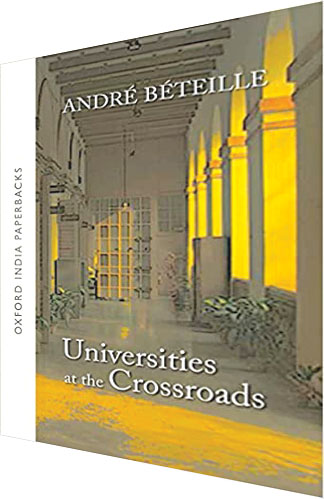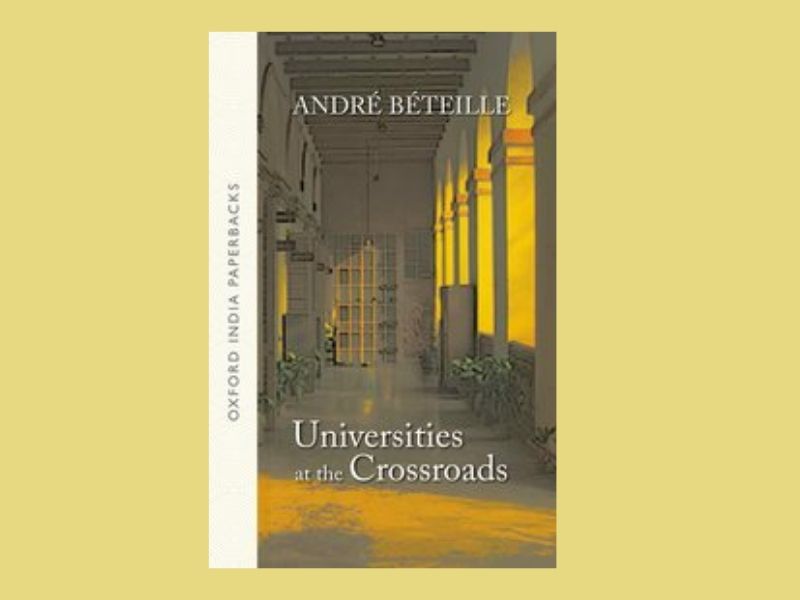
Oxford University Press; Rs.423; Pages 216
Currently chancellor of North Eastern Hill University, Shillong, and formerly professor of sociology at the Delhi School of Economics, Belgium-born, naturalised Indian Dr. Andre Beteille is a prolific writer who has addressed questions of inequality, power, social class, family, the disciplines of sociology and social anthropology, and a whole range of issues, too vast to enumerate. The array of issues he has sought to understand and his commitment as a writer, stem from his unfailing dedication to his profession as a sociologist, teacher and author. His new book on the university is therefore a welcome addition to the existing corpus of his work as, apart from articles in different journals, he has not explicitly addressed the problems of education in any single compendium. This book is a collection of convocation addresses and lectures that he has delivered on the broad theme of education, and the university in particular, at different forums in India.
The single most important point Beteille makes and continuously reiterates, pertains to the increasing demand
for social inclusion in higher education. This is no doubt essential in a democratic society but in the interest of teaching and research, Andre Beteille is concerned about the need for a university to simultaneously be academically discriminating.
This is the most striking argument Beteille makes throughout the book. He is careful to point out that there is a need to distinguish between, as he puts it, unwarranted exclusion on social grounds, and justifiable discrimination on academic grounds. While Andre Beteille supports all forms of social inclusion in higher education, his plea is to keep merit, ability and performance uppermost in all academic decisions. They must not be overtaken by ideology or other values that serve to undermine academic excellence.
As Beteille knows very well, the point however is that academic competence is largely an outcome of social and cultural capital. Those with cultural and social capital are the few who benefit from academic pursuits in higher education. The problem is complex and difficult to resolve. If social inclusion in higher education must prevail, there will necessarily be a lowering of academic standards to accommodate those who have thus far been deprived of higher education. Without the social and cultural capital so essential to their participation in an active and challenging academic life, they will be severely disadvantaged if they are expected to meet standards that will further exclude them.
What’s the way out of this conundrum? It seems to me that the university has a serious responsibility to combine social inclusion with strenuous efforts to develop the linguistic, technical and academic skills of students without the social and cultural capital whom it admits into its portals, rather than lower prevailing standards for reasons of political correctness and/or lethargy and lack of initiative. Without addressing this conundrum directly, Beteille is optimistic that Indian academia will overcome social exclusion. He cites Europe and China as examples of change and expresses hope that it will become possible in India as well.
In an important chapter ‘The School and the Community’, and in continuation of his argument, Beteille sympathises with well intentioned concern for providing equal access to school education, but warns it cannot ensure equality of outcomes. In addition he cautions that if we strive to maintain uniformity of outcomes, we will stifle effort, initiative and the pursuit of excellence. Providing equal access to education does not guarantee equality of outcomes. It is at best, a partial solution to the problem of social exclusion.
Andre Beteille’s concern about manifestations of inequality is significant to understanding what he describes as the contradictions of equality. Citing Raymond Aron, he observes that however much we may yearn for equality, some forms of inequality are inevitable. Change certainly has happened in India and elsewhere in the world, but this has not resulted in removal of glaring inequalities.
The last four essays in the book focus on the changing norms of university life and social science research. In a well argued essay, Beteille draws our attention to the distinction between institutions and networks in the context of educational structures.
Starting with the growth of knowledge within and outside the university, he provides a fascinating account of the development of universities into respected social institutions in Europe and the secular and scientific traditions established by their scholars and scientists. Despite the academic decline of India’s multiplying universities, he derives some comfort that networks of dedicated, serious scholars transcending institutional boundaries have also multiplied and that serious scholars benefit from these networks which are independent of the mediocrity and chaos that prevails in academic institutions today. This is an important and unexplored dimension in the growth of Indian academia as these networks sustain and contribute to the development of India’s higher education institutions and scholarly research, although Beteille does not seem to share this opinion.
Be that as it may, Beteille’s preoccupation is the decline of higher education institutions in India, the outcome of insufficient scholarly rigour, increasing bureaucratisation, and incremental social exclusion. This is a dominant theme of this book, by one of the few Indian sociologists who highlights the need for official social policy intervention.
In the penultimate chapter of this engaging compendium, he argues that utopianism is an obstacle to disciplined understanding of the manifestations of conflict and inequality that prevail in Indian society. It is only through the formulation of effective socio-economic policies that regulation and elimination of persistent inequalities in education and society becomes possible.
Meenakshi Thapan (The Book Review)
